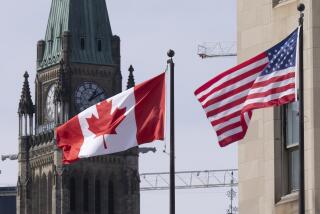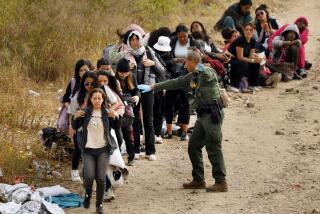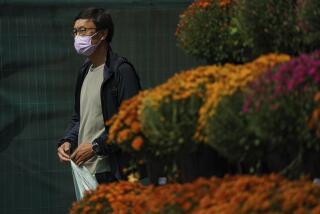SARS Warning Lifted in Toronto
Unexpectedly reversing itself, the World Health Organization on Tuesday lifted its week-old warning against unnecessary travel to Toronto because of the SARS virus, saying the cityâs outbreak has been brought under control.
Dr. Gro Harlem Brundtland, WHO director-general, announced the decision late Tuesday after spending the day meeting with Canadian and Ontario health officials who traveled to Geneva to argue their case.
Brundtland said she was swayed by three changes in Toronto since the WHO edict was issued last Wednesday: the number of probable SARS cases has decreased, it has been 20 days since the last case of community transmission was observed and no new exportation of cases from Toronto has occurred.
The Canadian officials also assured Brundtland that they would take stronger measures at Canadian airports to prevent people with SARS symptoms from boarding planes.
âWe are jubilant here,â said Dr. Tony Clement, the Ontario provincial health minister and one of the officials who met with Brundtland. âWe were able to bring the latest evidence of the state of SARS in Toronto and our efforts to contain its spread.â
Canada has had the largest outbreak of severe acute respiratory syndrome outside of Asia, with about 343 probable and suspected SARS cases and 21 deaths, most of them in the Toronto area. Although there have been no new cases of SARS other than among health-care workers, officials said they expected more deaths, because five SARS victims remain critically ill.
Worldwide, there have now been 5,462 cases of SARS -- including 52 in the United States -- and 353 deaths.
WHO said there was no change in Torontoâs status as an âaffected areaâ because of recent cases of transmission to health-care workers. Vietnam, which was the first country to contain its SARS outbreak, was removed from the list of affected countries Monday.
The advisory against unnecessary travel is still in effect for Beijing, Hong Kong and the Chinese provinces of Guangdong and Shanxi.
Business and government officials in Canada were pleased with the WHO decision but lamented the Canadian economy had already been severely wounded by the travel alert.
âThe damage has already been done,â said Rod Seiling, president of the Greater Toronto Hotel Assn. âWe think itâs going to be a one- to two-year program to recover whatâs already been done. We need to get back tourists, conventions and businesspeople.â
The travel warning âshouldnât have been done in the first place, but Iâm glad that theyâve lifted it so we can get back to normal,â said Toronto Mayor Mel Lastman.
He added the city will begin a $25-million advertising campaign to lure tourists back. The federal and provincial governments will contribute 80% of the funding, he said.
Various groups are making highly visible efforts to drive home the safety of the city. Toronto will host an international SARS meeting today and Thursday, the first outside Asia. Participants will include Dr. Julie Gerberding, head of the U.S. Centers for Disease Control and Prevention, and physicians with experience in treating SARS.
Canadaâs Cabinet, which rarely travels outside Ottawa, met in Toronto on Tuesday in a show of support.
âItâs important for government to show leadership,â Defense Minister John McCallum said. âA number of us have been providing moral support by being here, by going to dim sum and things of that nature.â
Last week, major league baseball cautioned teams visiting Toronto to avoid public transportation and crowded public places. The league initially recommended against signing autographs, then reconsidered and said players could do so but should use their own pens.
Tickets for Tuesday eveningâs Toronto Blue Jays game against the Texas Rangers were being sold for $1 with the hope of showing the world the safety of large gatherings. Tickets were going at the brisk pace of 2,000 per hour, and the stadium was sold out by late afternoon. The WHO announcement was played before the game, and the crowd of 48,097, the largest since opening day, erupted in cheers.
Torontoâs SARS outbreak can be traced back to 78-year-old Kwan Sui-Chu, who stayed on the ninth floor of Hong Kongâs Metropole Hotel on Feb. 21, where she contracted the virus from a Chinese physician.
She returned to Toronto on Feb. 23, fell ill on Feb. 25 and died at home March 5 after infecting her son, 44-year-old Tse Chi Kwai. He entered Torontoâs Scarborough Grace Hospital on March 7 and started a chain of infection that spread through several of the cityâs hospitals, a church group and a business meeting, as well as to at least two foreign cities.
Although the spread was partially due to bad luck, many think it could have been averted if physicians at Scarborough Grace Hospital had immediately placed Kwai in isolation. They cite the case of another visitor to the Metropole, a 55-year-old businessman, who developed SARS symptoms after his return to Vancouver. He was immediately masked and isolated, and the disease was contained.
Toronto officials said they were hoping to make it to May 10 with no new cases of public transmission.
âOnce 20 days goes by with no new cases, we can declare [the outbreak] over and hopefully lift the state of emergency thatâs been declared,â said Dr. Sheela Basrur, Torontoâs medical officer.
*
Times staff writers Usha Lee McFarling and Vicki Kemper contributed to this report.
More to Read
Sign up for Essential California
The most important California stories and recommendations in your inbox every morning.
You may occasionally receive promotional content from the Los Angeles Times.










